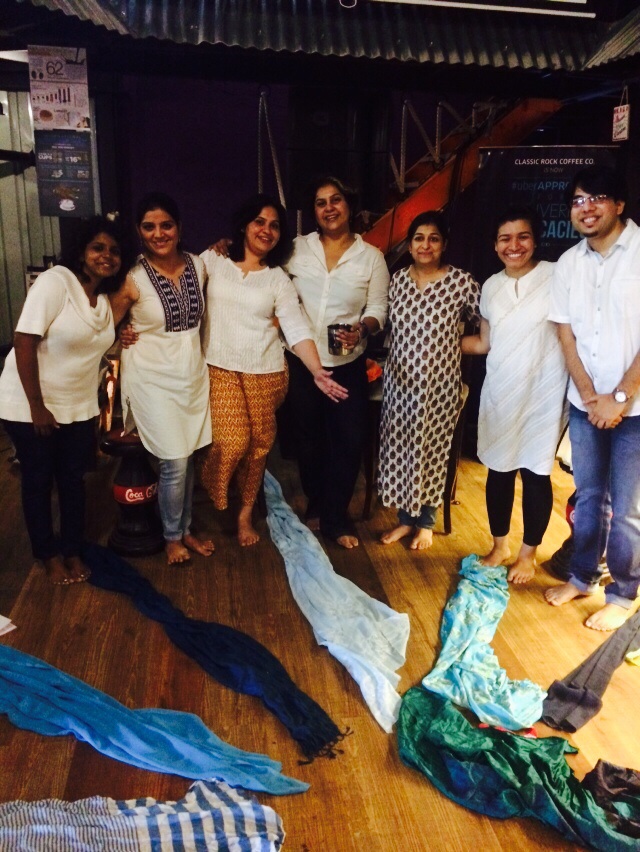
Vartika Gupta, Aarti Tiwari, Shweta Shukla, Hina Siddiqui, Aparna Kalantri, Arwa Janjali, Ritwik Borthakur
To be a part of something that is much bigger than you, is a strange feeling. The emotion that such an experience stirs may range from being completely humbled to feeling immensely powerful. The humility stems from realizing how insignificant you are in the larger scheme of things; while the sense of power is inspired by the knowledge that your actions, no matter how small, contribute to this whole.
This ‘feeling’ is impossible for me to articulate in any language and the attempt in the previous lines may have been futile. But I felt just that, as part of a small, seven-member team that recently performed a reading of a play, to an audience of about 35 people, at an unconventional venue (a rock themed coffee bar) in Pune, on a sleepy (and rainy) August afternoon.
However, it wasn’t much the location, the weather or the size of the audience that made a difference. The feeling stemmed from what I was a part of – the play itself – The Grandchildren of Hiroshima – true stories of real people who survived the atomic bombing in Hiroshima.
Initiated as an oral history and performance project, by London Bubble, a London based theatre group, in the year 2014, ‘The Grandchildren of Hiroshima’ is rooted in interviews between local children in Hiroshima and survivors who were the children’s age when the bomb was dropped. The project aimed to reach out to people across the world through community performances in August 2015 to commemorate the 70th anniversary of the Hiroshima bombings.
On August 6th 2015 and over that weekend, community theatre groups across Hiroshima, London, Wimborne, Palestine, Johannesburg, Brisbane, Milwaukee and Manila performed readings of ‘The Grandchildren of Hiroshima.’
And we (Orchestrated Q’Works) became a part of this inspirational global movement by reading the play in Pune.
Weeks before our performance, when we had started rehearsing, these powerful human stories of people residing miles away initiated a subliminal emotional upheaval in me. I knew I might never be able to truly empathize with them, as I have never been through such horrifying circumstances myself. It made a part of me feel grateful for my own protected life. However this gratitude was smeared with a sense of melancholy as somewhere I could sense a portion of the pain they had endured.
Most of these stories are very detailed and skillfully paint a vivid picture of the massive destruction and it’s agonizing after-effects. Part of the play also presents historical facts about the bomb, the war and the politics and conspiracy behind it.
But beyond all the politics and war, these were stories of real human suffering, tales of survival against all odds and most of all rebuilding life and one’s own being, piece by piece. Underlying somewhere in the recounting of all the demolition and death, is a story of hope and peace – a story that goes beyond the bounds of language, age, culture and borders.
Being able to share these stories; being a part of the vessel that transmitted the energy in these stories to others was an unforgettable experience. At the end of the performance, when we bowed, there was a sense of oneness … with the team, the audience, groups across the world who organized similar readings and with Hiroe, Hiroko, Teruko, Suzumi, Fumiaki and others who’s stories we shared through the play.
A feeling that is both humbling and empowering at the same time.
Contributed by Ritwik Borthakur
Follow him @RB_trary
Nicely written. Sometimes the feeling of ‘I am so insignificant, how does it matter what I do?’ gets so real that trying to do something seems pointless. But as you rightly put it.. doing is in itself that drop of contribution. Just that intention itself is powerful.
Another thing through which is oddly empowering is the thought ‘I am so insignificant that it doesn’t matter! So I can free myself from the cripling sense of ‘having’ to succeed. The freedom to make a mistake is liberating.
After one makes art, the art has it’s own mind. Then it goes into the world and does what it needs to do and has a life of its own without the creator/performer having to control it.
Insignificance is freedom.
Dear Dipabali,
No one could have put it more eloquently. Insignificance is Freedom. Thank you for sharing your thoughts with us.